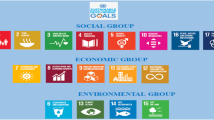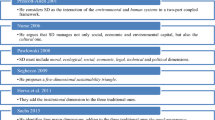Abstract
The paper deals with the usefulness of indicators and indices in assessing the performance of a city or territory with respect to the Sustainable Development Goals (SDGs) and their targets, in the context of the new European cohesion policy 2021–2027. An impact matrix has been developed in order to measure the performance of each indicator in achieving the SDGs and their targets in a real case study: the municipality of Rivoli, located in Piedmont region, which is currently involved in the programming of European and National recovery funds. The proposed model on the one hand can support the decision-making process in the assessment and monitoring procedures and on the other hand it can be of interest of technicians and freelances to simplify and optimize the conventional planning procedures to present project proposals of territorial transformation and with respect to the building of strategies with medium and long perspective. In this sense, this first application can determine the usefulness of the method to assess in a simple way the wide range of potential impacts, considering both the quantitative and the qualitative scale.
Access this chapter
Tax calculation will be finalised at checkout
Purchases are for personal use only
Similar content being viewed by others
References
Elmqvist, T., Andersson, E., Frantzeskaki, N., et al.: Sustainability and resilience for transformation in the urban century. Nat. Sustain. 2, 267–273 (2019). https://doi.org/10.1038/s41893-019-0250-1
United Nation: Transforming Our World Agenda Sustainable Development 2030 EngFreSpa AEL 151004 (2015)
UNISDR: The Sendai Framework for Disaster Risk Reduction 2015–2030: the challenge for science. R Soc Meet Note. A/CONF.224/CRP.1 (2015)
United Nations General Assembly: Seventy-First Session Agenda Item 20 Implementation of the Outcomes of the United Nations Conferences on Human Settlements And on Housing and Sustainable Urban Development and Strengthening of The United Nations Human Settlements Programme (UN-Habitat) Dr. 20637:32 (2016)
IPCC: IPCC Special Report on the Impacts of Global Warming of 1.5°C (2018)
European Commission: Strategic Foresight Report 2020 (2020)
Pillay, Y.P., Buschke, F.T.: Misaligned environmental governance indicators and the mismatch between government actions and positive environmental outcomes. Environ. Sci. Policy 112, 374–380 (2020). https://doi.org/10.1016/j.envsci.2020.07.010
Gencer, E.A.: A Handbook for Local Government Leaders (2017)
UNISDR: Making Cities Resilient Report 2012 (2012)
United Nations International Strategy for Disaster Risk Reduction: Hyogo Framework for Action 2005–2015: Building the Resilience of Nations and Communities to Disasters (2005)
DIPCOE: La programmazione della politica di coesione 2021–2027 - Documento preparatorio per il confronto partenariale (2019)
Utting, P.: Achieving the sustainable development goals through social and solidarity economy: incremental versus transformative change. In: Social Dimension of Sustainable development. UNRISD (2018)
Bottero, M., Mondini, G.: Valutazione e sostenibilità. Piani, programmi, progetti. CELID (2009)
Dell'Anna, F., Vergerio, G., Corgnati, S., Mondini, G.: A new price list for retrofit intervention evaluation on some archetypical buildings. Valori e Valutazioni 22, 3–17 (2019)
Bottero, M., Caprioli, C., Cotella, G., Santangelo, M.: Sustainable cities: a reflection on potentialities and limits based on existing eco-districts in Europe. Sustainability (2019). https://doi.org/10.3390/su11205794
Brambilla, A., Lindahl, G., Dell’Ovo, M., Capolongo, S.: Validation of a multiple criteria tool for healthcare facilities quality evaluation. Facilities 39, 434–447 (2021). https://doi.org/10.1108/F-06-2020-0070
UNISDR: Hyogo framework for action 2005–2015. In: United Nations International Strategy for Disaster Reduction (2005)
Lal, P.N., Mitchell, T., Aldunce, P., et al.: National Systems for Managing the Risks from Climate Extremes and Disasters (2012)
Appiotti, F., Assumma, V., Bottero, M., et al.: Definition of a risk assessment model within a European interoperable database platform (EID) for cultural heritage. J. Cult. Herit. 46, 268–277 (2020). https://doi.org/10.1016/j.culher.2020.08.001
Saaty, R.W.: The analytic hierarchy process-what it is and how it is used. Math. Model. (1987). https://doi.org/10.1016/0270-0255(87)90473-8
Barron, F.H., Barrett, B.E.: The efficacy of SMARTER—simple multi-attribute rating technique extended to ranking. Acta Psychol. (Amst) 93, 23–36 (1996). https://doi.org/10.1016/0001-6918(96)00010-8
Jesinghaus, J.: On the art of aggregating “apples & oranges”. Fondazione Eni Enrico Mattei (FEEM), Milano (2000)
Assumma, V., Bottero, M., De Angelis, E., et al.: A decision support system for territorial resilience assessment and planning: an application to the Douro Valley (Portugal). Sci. Total Environ. 756, 143806 (2021). https://doi.org/10.1016/j.scitotenv.2020.143806
Bottero, M., Datola, G., De Angelis, E.: A system dynamics model and analytic network process: an integrated approach to investigate urban resilience. Land 9, 242 (2020). https://doi.org/10.3390/land9080242
Parliament THEE, Council THE, The OF, Union E: Directive 2001/42/EC of the European Parliament and of the Council of 27 June 2001 on the Assessment of the Effects of Certain Plans and Programmes on the Environment (OJ L 197 21.07.2001 p. 30). Doc Eur Community Environ Law 295–307 (2010). https://doi.org/10.1017/cbo9780511610851.021
Assumma, V., Bottero, M., Datola, G., Pezzoli, A.: Climate Change and Urban Resilience. Preliminary Insights from an Integrated Evaluation Framework, pp. 1–10. Springer, Cham (2021). https://doi.org/10.1007/978-3-030-48279-4_63
Bottero, M., Dell’Anna, F., Nappo, M.: Evaluating tangible and intangible aspects of cultural heritage: an application of the PROMETHEE method for the reuse project of the Ceva–Ormea railway. In: Green Energy and Technology, pp. 285–295 (2018)
Yang, R.J.: An investigation of stakeholder analysis in urban development projects: empirical or rationalistic perspectives. Int. J. Proj. Manage. 32, 838–849 (2014). https://doi.org/10.1016/j.ijproman.2013.10.011
Author information
Authors and Affiliations
Corresponding author
Editor information
Editors and Affiliations
Rights and permissions
Copyright information
© 2021 Springer Nature Switzerland AG
About this paper
Cite this paper
Assumma, V., Datola, G., Mondini, G. (2021). New Cohesion Policy 2021–2027: The Role of Indicators in the Assessment of the SDGs Targets Performance. In: Gervasi, O., et al. Computational Science and Its Applications – ICCSA 2021. ICCSA 2021. Lecture Notes in Computer Science(), vol 12955. Springer, Cham. https://doi.org/10.1007/978-3-030-87007-2_44
Download citation
DOI: https://doi.org/10.1007/978-3-030-87007-2_44
Published:
Publisher Name: Springer, Cham
Print ISBN: 978-3-030-87006-5
Online ISBN: 978-3-030-87007-2
eBook Packages: Computer ScienceComputer Science (R0)




